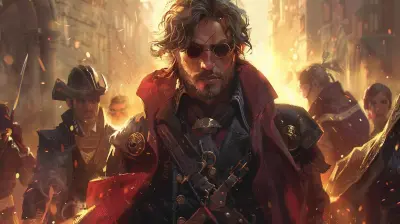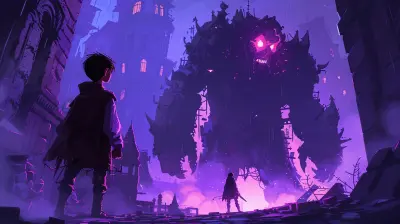Why Fans Care So Much About Game Award Results
12 August 2025
If you’ve ever scrolled through gaming Twitter the night of The Game Awards or any other major gaming ceremony, chances are you’ve seen emotions running high. People are typing in all caps, hashtags are going crazy, and debates that last for weeks instantly erupt. But why are game award results such a big deal? Why do fans get so fired up over a trophy that most of us will never physically lay eyes on?
Let’s dig into the heart of the matter and find out why fans care so much about game award results—and why this passionate reaction might actually make perfect sense.
The Emotional Investment in Games
Games Aren’t Just Games Anymore
When people pour 50, 100, or even 300 hours into a game, it becomes more than just entertainment. It’s part of their life. They’ve formed connections with the characters, explored massive open worlds, and perhaps even experienced emotional highs and lows that rival anything from a blockbuster film or bestselling novel.So when their favorite game gets nominated—or worse, snubbed—for a major award, it feels personal. It’s like if someone told you your favorite movie doesn’t deserve an Oscar because it wasn’t “artsy” enough. You’d naturally feel upset. Fans aren’t just watching games; they’re living them. So yeah, they take awards seriously.
Validation and Recognition Matter
When a Favorite Wins, It Feels Like a Personal Win
Everyone wants to feel seen, right? When the game you've been championing all year wins Game of the Year, it feels like your taste has been validated. It’s confirmation that the time you spent arguing with friends about why it’s a masterpiece wasn’t in vain.On the flip side, when it loses? Especially to a title you didn’t even think was that great? You feel robbed. Not just as a gamer, but as someone who emotionally connected with something that clearly meant more to you than it did to the critics or voting panels.
Tribalism in Gaming Communities
Fandom Wars Fuel the Fire
Here’s the thing: gamers are passionate, and with passion comes a bit of tribalism. Whether it’s PlayStation vs. Xbox, RPG fans vs. FPS fans, or indie lovers vs. AAA diehards, gaming communities are built around shared enthusiasm—and sometimes a little competition.Game award results act like trophies for these groups. If your console exclusive wins big, it feels like a win for your team. If a game from your favorite studio gets overlooked, it feels like a slight against your entire community. It may be a little irrational, but hey, so is getting worked up over sports, and we do that all the time.
The Power of Hype and Marketing
Awards Influence Industry Perception
Awards don’t just make fans happy—they also shape the way games are remembered. A title that wins Game of the Year often sees a massive boost in sales, gets revisited by players, and earns a spot in the gaming hall of fame for years to come.So, when fans feel like a deserving game gets ignored, it’s more than just pride on the line. It’s the legacy of the game. Think about that for a second. A win can solidify a game’s place in gaming history, while a loss might make it fade into obscurity. That’s why fans campaign, vote, and tweet like their lives depend on it.
Social Media Amplifies Every Reaction
Everyone Has a Voice (and an Opinion)
Platforms like Twitter, Reddit, and YouTube have turned award nights into global events. Fans don’t just watch anymore—they participate. They live-tweet reactions, post memes, create highlight compilations, and stir up discussions that trend worldwide in minutes.This constant chatter heightens emotions. When you see thousands of others hyped for your favorite game, it’s validating. But if your pick loses and the internet gets flooded with celebratory posts for another title? That stings. Social media magnifies every moment, turning wins into major celebrations and losses into mini Internet wars.
Nostalgia and Longtime Loyalty
Fans Remember Who Got Snubbed
Gamers have long memories. Ask any longtime fan about a game they believe was unfairly overlooked, and you’ll get a passionate TED Talk on the subject. Whether it’s the injustice of Red Dead Redemption 2 losing to God of War, or an indie gem that didn’t even get nominated, fans carry these moments with them.This emotional baggage builds up over time. When their favorite developer or genre finally gets a win, it feels like justice has been served. And when injustice strikes again? Oh boy, that's adding fuel to a fire that never really goes out.
It’s About More Than Just the Game
Awards Can Reflect Industry Progress
Let’s be real—gaming has a representation problem. For years, AAA titles were dominated by certain narratives, styles, and voices. When a more diverse, inclusive game wins an award, fans see that as progress. It’s proof that their voices are being heard and that the industry is moving in the right direction.That’s why some game award results carry more weight than others. A win for a game with a female lead, a diverse cast, or an unconventional story isn’t just a win for the game—it’s a win for the culture. Fans care about that.
The Drama Is Part of the Fun
Controversy Keeps the Conversation Going
As much as we hate to admit it, drama is part of the fun. People love debating, predicting winners, and throwing around hot takes. It’s why weeks before award shows, fans create fake ballots, prediction videos, and “snubbed” lists.The arguments, the outrage, the surprises—it’s all part of the show. Some gamers even tune in just to see how mad people will get when their favorite indie title loses to a big-budget blockbuster. The drama keeps things spicy, and the community engagement skyrockets because of it.
The Impact on Developers
Fans Want Their Favorite Devs to Get Their Moment
Behind every game is a team of humans working crazy hours to bring it to life. When a game wins, it’s not just about recognition—it’s a moment of pride for everyone involved. Fans often grow attached to certain studios or creators. They want these devs to succeed, to be recognized, and to continue making games they love.Celebrating their win feels like cheering on a friend. And seeing them lose can make fans feel like the industry doesn’t appreciate the hard work, creativity, or risks that went into making something special.
The Awards Shape the Future
Success Leads to More of the Same
Let’s talk business for a second. Game awards can (and do) influence what kind of games get made next. A studio’s success at an award show can guide what projects get greenlit. If narrative-focused action games are winning year after year, guess what we’re getting more of?That’s why fans push so hard for their favorites to win. It’s not just about this game—it’s about future games too. A win means more of what they love. A loss? It might mean the industry takes a different path, away from what fans want to see.
Not All Award Shows Are Equal
Some Awards Matter More Than Others
While most people talk about The Game Awards, there are tons of other ceremonies—Golden Joystick Awards, BAFTA Games Awards, D.I.C.E. Awards, and more. But fans tend to get more worked up over certain ones, especially those with live broadcasts, celebrity appearances, or big reveals.The more mainstream the award show, the more eyes are on it—and the more emotions get wrapped up in the outcome. It’s kind of like how people care more about who wins the Oscars than a critics circle award. Visibility matters, and fans want their favorites to shine when the spotlight is brightest.
Conclusion: Passion Isn’t a Bad Thing
So why do fans care so much about game award results? Because they care about games. Plain and simple. Whether it’s for emotional validation, industry impact, or just bragging rights, awards mean something to the people who live and breathe gaming culture.Sure, things can get heated, and sometimes the arguments go a little too far. But at the core of all the noise is passion. And if anything, that’s proof of how powerful and meaningful video games have become in our lives.
When fans cheer, rage, or cry over a game award, they’re not just reacting to a gold statue—they’re reacting to something that moved them. And in the end, isn't that what great games are supposed to do?
all images in this post were generated using AI tools
Category:
Game AwardsAuthor:

Lana Johnson
Discussion
rate this article
2 comments
Helen McFadden
What a fantastic read! It’s truly fascinating how game awards resonate with fans, highlighting their passion and investment in the gaming community. Your insights beautifully capture the emotional connection we all share with our favorite titles. Looking forward to more great content!
February 11, 2026 at 3:54 AM
Makayla McEvoy
Game award results reflect fans' passion and investment in their favorite titles, highlighting the industry's impact on culture and community.
August 28, 2025 at 3:12 AM

Lana Johnson
Absolutely! Game award results serve as a celebration of fans' dedication, showcasing how deeply games influence culture and foster community connections.


